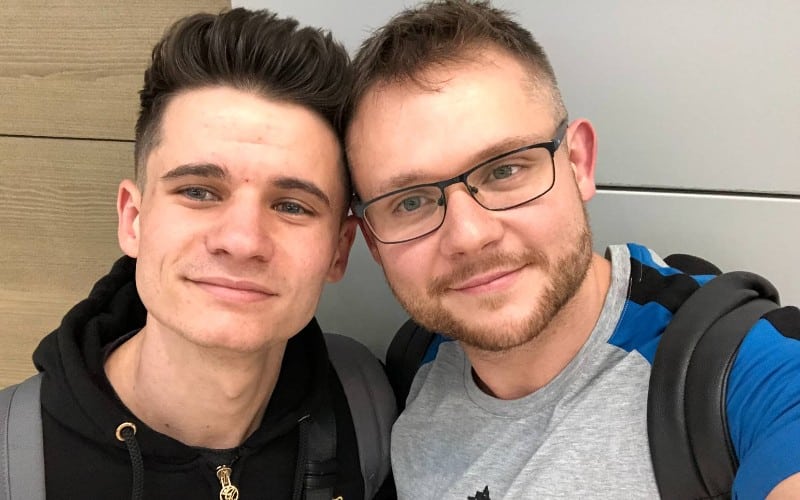

Hello. My name is Rhys Evans I’m a GP in Cardiff, South Wales. I wanted to contribute something for Thymic Cancer Awareness Month even though I am not a patient. My late fiancé Lucien tragically died from Thymic Cancer at the age of 25 in May 2021. He had no other underlying health problems. He was diagnosed with an extremely rare subtype of Thymic Cancer, Primary Thymic Mucinous Adenocarcinoma. As difficult as it is for me to write this I want to share my views as a partner, carer and doctor during Lucien’s journey with cancer, which from beginning to end, was less than 3 months.
It was during COVID-19 lockdown in early 2021 where Lucien began coughing every so often. He tested himself for COVID and all was negative. It was however still winter and it is hardly surprising for someone to pick up a common cold virus.
A few weeks went by and Lucien’s coughing gradually worsened. It did not respond to typical coughing remedies even codeine linctus. So, with my stethoscope I listened to his chest (again) which sounded quite unremarkable except this time the breath sounds on the left side of his chest did not expand as well as the right.
He initially refused to go to the GP as he attempted to reassure me that he felt well and that it was ‘just an irritating cough’. The GP had similar concerns about his chest as I had. Lucien was persuaded to get a chest Xray that day and that’s when a mass was found on the top left side of his chest. He was kept overnight and after several blood tests (which all returned normal!?) the initial impression is that he had lymphoma.
He had a fine needle biopsy which was inconclusive but was then queried to be a Germ Cell Cancer. Due to the uncertainty, he was admitted to have a surgical biopsy of the mass that was pressing on the vagus nerve (which controls the cough reflex) hence an explanation for his symptoms.
Unfortunately, there was a delay in getting his final diagnosis. We were told that a Germ Cell Cancer was still probable until there was a consensus from multiple specialist pathologists (from different parts of the UK) that this was a form of Thymic Cancer. Lucien began a course of Chemotherapy comprising of Capecitabine and Oxaliplatin.
Stepping onto the Chemotherapy Day Unit proved to be quite a harrowing experience not because of the chemotherapy itself but because of the environment. All the other patients were elderly, at least 3 times his age. This was despite seeing many younger patients at the Oncology Clinic at the Tertiary Cancer Centre in Cardiff. Later I saw younger patients on a different Chemo Day Unit ward. Could this not be co-ordinated better? Whether it should or shouldn’t it proved to be a big psychological blow.
Over the proceeding weeks it became more obvious that the recent surgery, chemotherapy and of course the cancer itself was taking a large toll. He developed quite an intense anxiety that was claustrophobic in nature and he had some panic attacks which were extremely difficult to witness. He began requesting the windows be open everywhere he went. Although it was a simple request it would often be enough to abate his anxiety. Lucien had no history of mental health problems. This new anxiety was partly due to the mass effect of the cancer and is a phenomena that is witnessed in patients with cancer originating in the thorax. When a person is anxious, nutrition can be compromised due to a low appetite. A course of steroids (Prednisolone) may not resolve low appetite and may in fact worsen anxiety. Such was the case.
A very kind MacMillan Psychologist saw Lucien and I and organised to see him again the following week. Unfortunately, Lucien required admission to hospital due to deterioration and he tragically passed away 4 days later in his sleep. I was told that his cancer had progressed significantly. The chemotherapy simply did not work. During his last days he received excellent, compassionate care at University Hospital of Wales, Cardiff.
As a clinician, what I have learnt is: